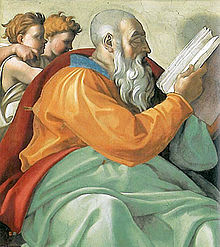Zechariah (Hebrew prophet)

Zechariah[a][1] was a person in the Hebrew Bible traditionally considered the author of the Book of Zechariah, the eleventh of the Twelve Minor Prophets.
Prophet

The Book of Zechariah introduces him as the son of Berechiah, the son of Iddo.[2] The Book of Ezra names Zechariah as the son of Iddo,[3] but it is likely that Berechiah was Zechariah's father, and Iddo was his grandfather.[4] His prophetical career probably began in the second year of Darius the Great, king of the Achaemenid Empire (520 BCE). His greatest concern appears to have been with the building of the Second Temple.[4]
Possible allusion by Jesus
He was probably not the "Zacharias" mentioned by Jesus in the Gospel of Luke[5][6] and the Gospel of Matthew, "from the blood of innocent Abel to the blood of Zacharias the son of Barachiah, whom you murdered between the sanctuary and the altar".[7] Jesus' words are interpreted as: from the first victim of a murder (Abel), to the last martyr (Zechariah), by which Zechariah ben Jehoiada was more likely meant, as representing the last of the martyrs recorded in the Masoretic Text.[6] However, some scholars still identify him with the later prophet Zechariah, rather than the priest Zechariah of the 9th century BCE, as the Gospel of Matthew records his name as "Zechariah son of Berechiah", and the prophet Zechariah is indeed listed as the son of Berechiah.[8]
Liturgical commemoration
On the Eastern Orthodox liturgical calendar, his feast day is February 8. He is commemorated in the calendar of saints of the Armenian Apostolic Church on the Tuesday after the fifth Sunday of Pentecost[9] and, with the other Minor Prophets, on July 31. The Roman Catholic Church honors him with a feast day assigned to September 6.
See also
- Tomb of the Prophets Haggai, Zechariah and Malachi
- Zechariah (given name) for the derivation and translations of his name
- Zechariah (priest), the father of John the Baptist in the New Testament
Notes
References
Footnotes
- ^ Khan, Geoffrey (2020). The Tiberian Pronunciation Tradition of Biblical Hebrew, Volume 1. Open Book Publishers. ISBN 978-1783746767.
- ^ Zechariah 1:1
- ^ Ezra 5:1 and Ezra 6:14
- ^ a b Hirsch, Emil G. (1906). "Zechariah". In Cyrus Adler; et al. (eds.). Jewish Encyclopedia. New York: Funk & Wagnalls Co.
- ^ Luke 11:51
- ^ a b Pao, David W.; Schnabel, Eckhard J. (2007). G. K. Beale; D. A. Carson (eds.). Luke 11:49-51. Baker Academic. ISBN 9781441210524. Retrieved 8 August 2021.
most identify this figure with the Zechariah of 2 Chron. 24:20–25, who was killed in the temple court
{{cite book}}:|work=ignored (help) - ^ Matthew 23:35
- ^ Zech. 1:1
- ^ Domar: the calendrical and liturgical cycle of the Armenian Apostolic Orthodox Church, Armenian Orthodox Theological Research Institute, 2003
Bibliography
 This article incorporates text from a publication now in the public domain: Easton, Matthew George (1897). "Zechariah". Easton's Bible Dictionary (New and revised ed.). T. Nelson and Sons.
This article incorporates text from a publication now in the public domain: Easton, Matthew George (1897). "Zechariah". Easton's Bible Dictionary (New and revised ed.). T. Nelson and Sons.
